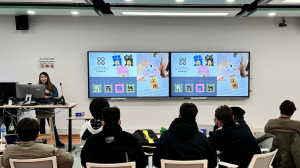A study involving an academic from IFTM offers a playbook for hoteliers regarding how to address in a way positive for their business what the researchers call ‘negative electronic word of mouth’ or ‘negative eWOM’. The work, based on a piece of research covering hospitality properties in Hong Kong, highlights that effective handling of negative online reviews is a must nowadays for any hotel.
The study identified a set of “3 practical recommendations” for management of online hotel reviews. First, hotels can “enhance their visibility on ‘electronic word of mouth’ websites” – such as popular international travel platform TripAdvisor.com – by increasing the volume of customer reviews and improving their hotel ranking on those websites, it was suggested. Second, each hotel should implement “a comprehensive mechanism” to handle and manage negative online reviews. Third, hotels should “exploit and transform ‘electronic word of mouth’ into business intelligence”.
The study was carried out by IFTM scholar Dr. Yvonne Chen Yi Fan, in partnership with Prof. Rob Law – an expert in ‘smart’ tourism – and Mr. Kirk Yan Ka Kui, the latter a former scholar at IFTM. The findings were featured in the academic paper “Negative eWOM Management: How Do Hotels Turn Challenges into Opportunities?”, published last year in the Journal of Quality Assurance in Hospitality and Tourism.
The research included interviews with senior and middle management staff working in upscale and luxury hotels in Hong Kong, with interviewees being asked about their responses to negative online reviews. In addition, the researched hotels’ management responses posted on TripAdvisor addressing online reviews – covering a period of 12 months – were downloaded for content analysis.
Findings revealed that hotel managers perceived ‘electronic word of mouth’ not only affected hotel reputation and business revenue, but also made the management of customer expectations difficult. “Positive ‘electronic word of mouth’ motivates the management and the team to keep up their good work, whereas negative ‘electronic word of mouth’ is customer-driven learning that drives hotels to identify the problems and make continuous improvement,” concluded the researchers.
Destructive power
The researchers pointed out that, “in this digital age, the Internet provides angry consumers an easy means to vent their dissatisfaction.” Negative communications shared among online users “exert a strong and destructive influence on hospitality business,” they added.
The team of researchers suggested hotels – particularly small- and medium-sized properties that are lesser known in the market, and any property that relies on bookings made online – should “actively manage their presence on ‘electronic word of mouth’ channels, for brand image reinforcement and revenue generation”. In that regard, boosting review volume could enhance the visibility of a hotel on review websites, the researchers suggested. “Hotels can place iPads at the service counters and invite guests to write a review when they are checking out”, offering them drinks so that guests can take their time to write comments, the team said.
In situations where a customer has already left the hotel premises and has posted a negative online review, “hotels can invite complainers to post a few words on top of their initial negative reviews” after management successfully addresses the issues mentioned in the original post. “Those subsequent reviews can turn the influence of a negative comment into a positive one,” noted the scholars.
Hotels can also invite bloggers or other online opinion leaders to write reviews on their products, it was said in the study. “These professional review writers know how to skilfully draft a desirable commentary and are especially influential to the young generation of Chinese customers.”
The researchers also highlighted the need for hotels to have in place a set of company policies and guidelines to “effectively and efficiently monitor and respond” to negative online reviews. “To safeguard and manage the company image, hotels should be alert to various risks posed by social media and establish a specific mechanism to monitor, capture, and transmit the signals of potential crises to the designated response centre for timely follow-up,” it was suggested.
The study additionally pointed to the potential of online reviews as a source of valuable yet low-cost business intelligence. “After having gained a deeper and wider understanding of ‘electronic word of mouth’, hotels can better leverage the modern trend of online social networking to enhance the competitiveness of their products and effectively map out appropriate e-marketing strategies,” said the researchers.
More info
Prof. Rob Law currently is the University of Macau Development Foundation (UMDF) Chair Professor of Smart Tourism. He is also an honorary professor at several other reputable universities. Prof. Law holds a PhD in Computer Science from the University of Regina, in Saskatchewan, Canada. He has received many research-related awards and honours, as well as several external and internal research grants.
Mr. Kirk Yan Ka Kui currently is Assistant Director of Food and Beverage at integrated resort MGM Cotai. He was a lecturer at IFTM from 2014 to 2017. His professional experience includes work for different upscale hotels and restaurants in Switzerland and Hong Kong, as well as integrated resorts in Macao.
https://doi.org/10.1080/1528008X.2021.1911729









